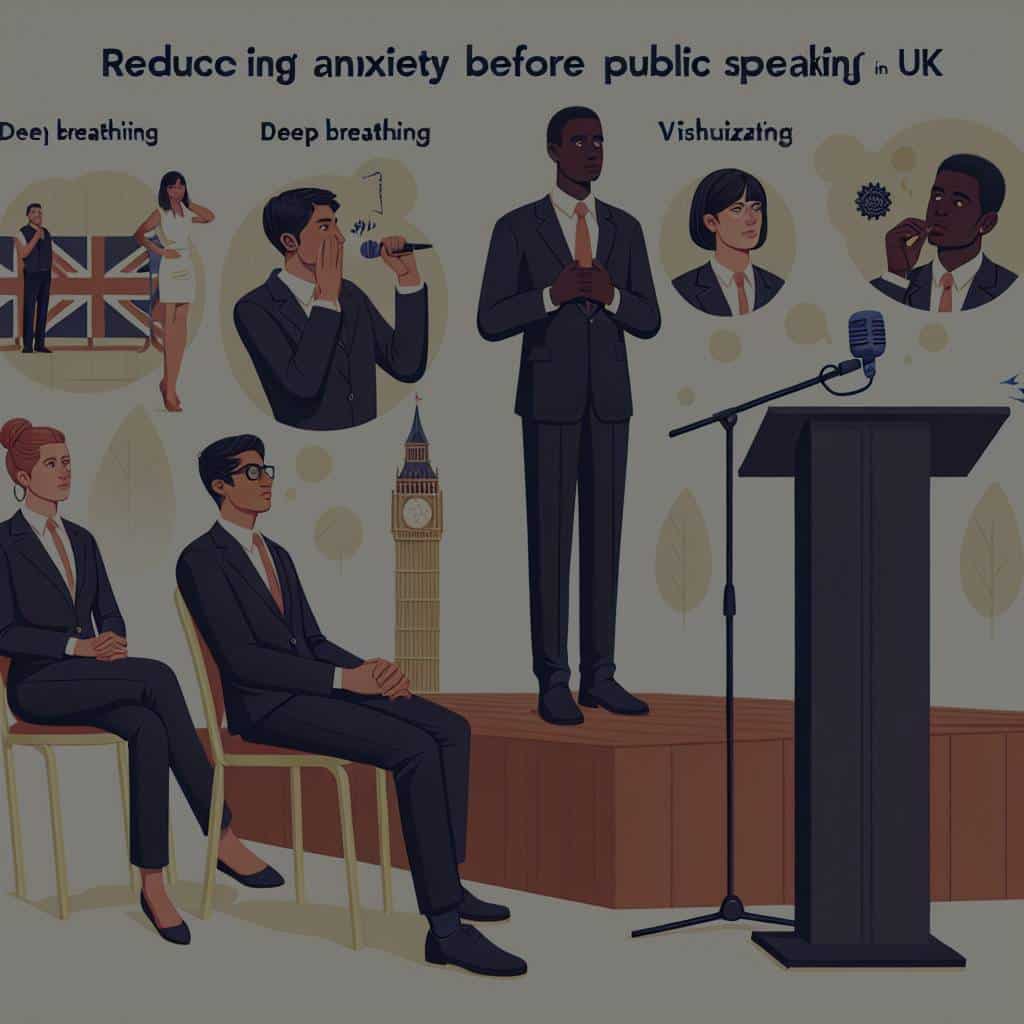Public speaking is a common fear for many people. The thought of standing up before an audience and sharing your thoughts can be nerve-wracking. The fear of public speaking, or "glossophobia", can lead to anxiety and a lack of confidence. However, it’s not something that can’t be defeated. In this article, you’ll learn about some of the best techniques for reducing anxiety before public speaking. We’ll discuss what you can do to manage your nerves and improve your presentation skills. We’ll also talk about how you can feel more comfortable in front of an audience and build up your confidence.
Understanding the Fear of Public Speaking
Before diving into the methods of reducing anxiety, it’s crucial to understand why public speaking often causes fear. This understanding will help you tackle the problem at its root.
This might interest you : DIY projects with porcelain stoneware: ideas and inspiration
For many people, the fear of public speaking is linked to a fear of being judged or making a mistake in front of others. This fear can be heightened when the audience is composed of peers or superiors. However, it’s important to remember that your contribution to the conversation is valuable, and everyone makes mistakes.
Many public speakers fear the unknown. You may wonder how the audience will respond to your presentation, or you may be unsure of how to handle unexpected questions. These uncertainties can fuel your anxiety.
Also to read : What Are the Best Tools for Budgeting and Saving Money for UK Millenials?
Techniques for Preparing Your Presentation
Preparing your presentation ahead of time can significantly reduce anxiety. When you are well-prepared, you will feel more confident in your ability to deliver your speech effectively.
Firstly, thoroughly research your topic. Knowledge is power, and the more you know about your subject, the more confident you’ll feel. This preparation will also help you answer any unexpected questions that may arise during your presentation.
Secondly, practice your presentation multiple times before the actual event. You can practice in front of a mirror or a small group of people you trust. This will help you familiarize yourself with your material and give you a chance to work out any kinks in your delivery.
Lastly, prepare for potential questions and criticisms. Anticipate the issues your audience may raise and have responses ready. This will help you feel more in control during your presentation.
Techniques for Managing Your Anxiety
There are several techniques you can use to manage your anxiety before a public speaking event.
Firstly, deep breathing exercises can be very effective in calming your nerves. Take a few moments before your speech to focus on your breathing and clear your mind.
Secondly, visualize your success. Picture yourself delivering a successful presentation and receiving positive feedback from your audience. Visualization can help boost your confidence and reduce anxiety.
Thirdly, consider using positive affirmations. Reassure yourself that you are capable and competent. Remind yourself that you have prepared well and are ready to deliver a great presentation.
Finally, try progressive muscle relaxation. This technique involves tensing and then relaxing each muscle group in your body, starting from your toes and working your way up to your head. This can help reduce physical symptoms of anxiety.
Techniques for Engaging Your Audience
Engaging your audience can help you feel more comfortable during your presentation. When your audience is engaged, they’re more likely to respond positively to your presentation, which can boost your confidence.
To engage your audience, make eye contact. This can help you establish a connection with your audience and make your presentation feel more personal.
Ask questions to encourage audience participation. This can break up your presentation and keep your audience interested. It also provides an opportunity for you to gauge your audience’s understanding and adjust your presentation accordingly.
Lastly, use anecdotes and personal stories to make your presentation more relatable. These can help your audience connect with your material on a personal level.
Techniques for Building Confidence in Your Public Speaking Skills
Building confidence in your public speaking skills takes time and practice, but it can significantly reduce your anxiety.
One effective technique is to join a public speaking group or take a public speaking course. These provide opportunities to practice speaking in front of others and receive constructive feedback.
Another technique is to start with smaller audiences and work your way up. As you gain more experience and receive more positive feedback, your confidence will grow.
Last but not least, don’t forget to reward yourself after each presentation. Recognizing your accomplishments can help build your confidence and motivate you to continue improving your public speaking skills.
Techniques for Using Body Language Effectively
Body language plays a significant role in public speaking. The way you carry yourself can influence your audience’s perception of you and your message. Conversely, being aware of your body language can also help reduce your speaking anxiety.
To begin with, maintain good posture. Standing tall exudes confidence and ensures your voice carries well through the room.
Next, make eye contact with your audience. This not only helps to engage your audience but also creates a sense of connection, making your presentation feel more intimate.
Use expressive hand gestures to emphasise key points. This can not only make your presentation more dynamic and interesting, but it can also help you articulate your thoughts better.
Control your facial expressions. Smile when appropriate and maintain a relaxed, friendly expression. This will make you appear more approachable and relatable to your audience.
Finally, use movements to your advantage. Walking or moving around can help you burn off some nervous energy and can also help to keep your audience engaged.
Remember, your body language speaks volumes about your confidence and credibility. Therefore, being mindful of your body language can significantly enhance your presentation skills and reduce your fear of public speaking.
Conclusion: Embrace the Challenge of Public Speaking
Public speaking can seem daunting, but it is a skill that can be mastered with the right techniques and a lot of practice. The fear of public speaking, often referred to as glossophobia, is something that many people struggle with, but it need not hold you back.
Understanding the root causes of your anxiety and addressing them can go a long way in helping you overcome your fear. Preparation is key, and being well-versed in your topic will not only boost your confidence but also ensure you deliver an impactful and insightful presentation.
Engaging your audience, whether through eye contact, open body language or thoughtful questions, can make your presentation more interesting and relatable. Furthermore, adopting anxiety management techniques, such as deep breathing and visualization, can help calm your nerves before your presentation.
Remember, every public speaking opportunity is a chance to learn and grow. Therefore, don’t be too hard on yourself. Even seasoned speakers make mistakes. What’s important is not to let fear deter you from expressing your contributions and thoughts. With time, practice, and patience, you can become an effective and confident public speaker.
So, do not fear public speaking. Instead, love it, embrace it, and celebrate it as an opportunity for growth. After all, overcoming your speaking anxiety will not only enhance your presentation skills but also your overall communication skills, which are invaluable in every walk of life.






